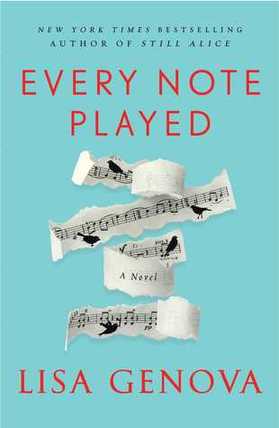Every Note Played by Lisa Genova
This is the beginning of ALS or motor neurone disease, and it’s no consolation that Stephen Hawking suffered from the same condition. Before too long the grand piano in his living room seems to mock him, given that he’s lost the use of his hands. Dependent on a succession of carers, he progressively loses control of his body. But then Karina surprises them both by offering to have him move back into the family home to assist with his care. It’s not an easy situation for either of them, and there’s no guarantee that they’ll mend their broken relationship before they run out of time.
An interest in music in fiction and the chance to learn more about this most devastating neurological disorder drew me to Lisa Genova’s fifth novel, and her expertise in both areas meant I was not disappointed on either count. But it’s for the author’s compassion for her flawed characters, and the emotional range and depth, that makes Every Note Played a potential contender for one of my favourite reads of the year. Often wary of a redemption-through-catastrophe-or-suffering narrative (too reminiscent of my Catholic childhood; too aware that it doesn’t always work out so well), I really appreciated eavesdropping on this family’s bumpy journey to some kind of resolution. In summary, it’s a poignant novel about loss; the compromises of marriage; the loving and hating that’s part of any caring/dependency dynamic; and the risks of both following and shying away from your dreams. Thanks to publishers Allen & Unwin for my advance proof copy.
For another novel about a concert pianist developing a debilitating disorder that prevents him from performing, see School of Velocity.
May by Naomi Krüger
We catch glimpses of May’s preoccupations from early morning to almost midnight across a single day, but the fragmented text – with gaps ingeniously representing her state of mind – gains meaning only alongside the chapters narrated from the points of view of her family members. Moving back and forth in time, from 1957, when her husband-to-be braves the disapproval of her mother, to 2007, when grandson Alex tries to find the courage to be himself. Intertwined with the story of May’s own family is Afsana’s struggle to break free, first from the restrictions imposed by her own grandmother’s conservatism, then from her bullying partner. As they mourn the loss of May’s personhood, is there hope that the younger generation might live without secrets and doubt?
Naomi Krüger’s debut novel is a moving story of family, memory and the road not taken, inspired by “a family friend in the early stages of dementia who remembered things about Naomi’s life that she herself had forgotten”. Thanks to Seren books for my review copy. Follow the link for my reflections on four other novels about dementia and/or on two novels set in care homes. Or here for a related short story based on a scene from my second novel, Underneath (which is partly set in the same part of the country as May).
| Over at the Carrot Ranch, Charli invites us to write a 99-word story about fingers that fly. Although I already had my fix with a flash about turning pages, I couldn’t resist another to tie in with Every Note Played. |
The fingers of his left hand dance across the piano keys. The fingers of his right just dance. And jerk. Spasm. Fly. A dance without pattern to the movement. Or not one his brain can predict or control. If he weren’t consumed with self-pity, he’d laugh.
The day will come when he’ll remember this as freedom. Nostalgic for his flying fingers whether making music or senseless noise. As one by one his motor neurones cease firing, leaving him a drooling mannequin in a wheelchair. The man whose virtuoso playing moved the world, unable to move himself beyond a blink.
























 RSS Feed
RSS Feed





















